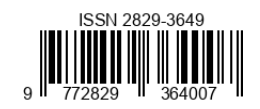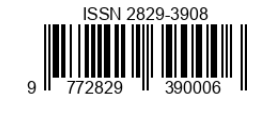FACTORS AFFECTING PRAGMATIC TRANSFER TO FOREIGN LEARNERS
DOI:
https://doi.org/10.56910/literacy.v1i1.228Kata Kunci:
Pragmatics Transfer, Sosio pragmatic, Pragmalinguistic, Psyschopragmatic.Abstrak
Pragmatic transfer is currently the subject of research by many researchers. Sociopragmatic and linguistic pragmatic factors were discovered as aspects influencing practical transfers. The aim of this study is to examine the aspects that drive the development of pragmatic transfer. This study used the discourse completion test. This required interviewing 33 of his English students and 33 of her Arabic students. This research shows that there is a psychoparagmatic dimension to how foreign language learners use and influence the language they are learning in interacting with others. By observing the psychology of the languages spoken by Arabic and English students in UIN Alauddin Makassar, the mental-practical aspects that were the focus of the researcher's analysis of this study were found to be social-practical. It had the same effect as the physical aspect.
Referensi
Austin, J.L.(1962). How to do things with words (edited by J. O. rmson and M. Sbisà).Cambridge, MA: Harvard University Press.
Beebe,L.M.,Takahashi,T.,&Uliss-Weltz,R.(1990). Pragmatic transfer in ESL refusals. In R.C.Scarcelle, E.Anderson,& S.C.Krashen (Eds.),Developing communicative competence in a second language (pp. 55-73). New York: Newbury House.
Bergman,M.,& Kasper, G.(1993). Perception and performance in native and nonnative apology. In G.Kasper &S.Blum- Kulka (Eds.). Interlanguage Pragmatics (pp.82-107). Oxford: OUP.
Blum-Kulka,S.(1983). Interpreting and performing speech acts in a second language - A cross-cultural study of Hebrew and English. In N. Wolfson & E. Judd (Eds.), Sociolinguistics and language acquisition (pp.36-55). Rowley, MA: Newbury House.
Bou, F. (1998). On pragmatic transfer. Studies in English language and linguistics, 0, 5-20.
Briska,S.(2013). A pragmatic analysis of compliments in Hausa social contexts. Unpublished doctoral dissertation. Ahmadu Bello University. Nigeria
Brown, D.(1994). Principles of language learning and teaching. USA: Prentice Hall, Inc.
Cedar,P. (2006). Thai and American responses to compliments in English. The Linguistics Journal , 1(2), 6-28.
Chen, R. (1993). Responding to compliments: A contrastive study of politeness strategies between American English and Chinese speakers. Journal of Pragmatics, 20, 49-70.
Enssaif, Z.A.(2005). Compliment behavior: Strategies and realizations in English and Arabic. Unpublished Master's dissertation. King Saud University. Kingdom of Saudi Arabia.
Golato, A. (2002). German compliment responses. Journal of Pragmatics , 34 , 547-571
Golato,A.(2003). Studying compliment responses: A comparison of DCTs and recordings of naturally occurring talk. Applied Linguistics, 24 (1), 90-121.
Lorenzo-Dus, N. (2001). Compliment responses among British and Spanish university students: A contrastive study. Journal of Pragmatics, 33, 07-127.
Nelson,G.,Al-Batal, M., & Echols, E. (1996). Arabic and English compliment responses: Potential for pragmatic failure. Applied Linguistics, 17 (4), 411-432.
Nelson,G.,El-Bakary,W.,&AlBatal,M.(1993). Egyptian and American compliments: A cross-cultural study. International Journal of intercultural relations, 17 (3), 293-313.







